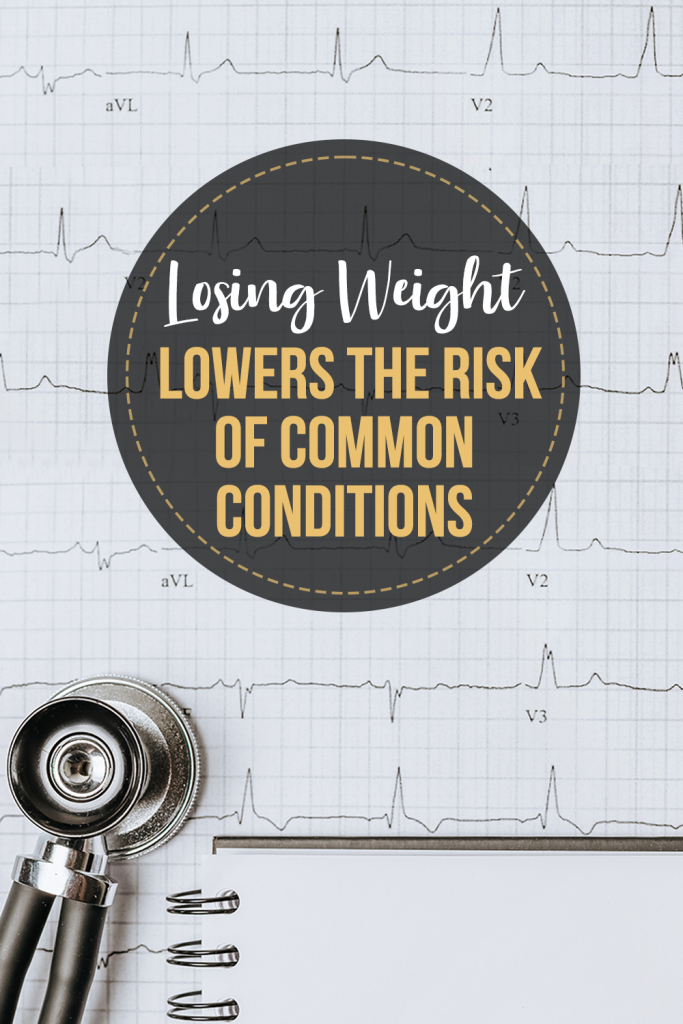
Losing Weight Lowers the Risk of Common Conditions
March 21, 2022Losing Weight Lowers the Risk of Common Conditions: Obesity is when your body weight is above normal. Having extra weight can predispose you to several medical conditions including heart disease, type 2 diabetes, high blood pressure, high cholesterol, sleep apnea, arthritis, infertility, and certain cancers.
The combination of excess weight and these diseases leads to a higher likelihood of poor health, poor quality of life, and shorter lifespan. However, many of these disease processes can be treated with significant weight loss.
Losing Weight Lowers the Risk of Common Conditions
High Blood Pressure
Several studies have evaluated the effect of weight loss on high blood pressure. There is strong evidence that weight loss produced by lifestyle modifications (diet and exercise), results in reduced blood pressure levels. Similar results are found with the use of several weight loss medications.
Weight loss (bariatric) surgery, has been shown to significantly reduce the use of blood pressure medication in over 80% of patients. A complete cure of high blood pressure is seen in about 50% of patients after bariatric surgery.
High Blood Cholesterol
The effect of weight loss on blood levels of cholesterol has been studied extensively. Weight loss through lifestyle modification leads to reductions in triglyceride, total cholesterol, and LDL-cholesterol levels- the bad types of cholesterol while increasing the levels of HDL-cholesterol, the good type.
Weight loss that results from medication does not lead to consistent improvements in cholesterol levels.
Bariatric surgery has been shown to reverse the abnormal cholesterol levels associated with obesity. These effects are sustained for several years after surgery, contributing to long-term improvements in cardiovascular health.
Type 2 Diabetes
Type 2 diabetes is another major health concern associated with obesity. Studies that examined the effect of weight loss on blood sugar levels have found positive results. Weight loss through lifestyle modification reduces blood glucose levels in obese patients with and without type 2 diabetes. Pharmacotherapy does not provide similar results.
Bariatric surgery has profound effects on blood sugar levels. Studies suggest that after weight loss surgery, 87% of patients achieve improved glucose control and require fewer medications for the treatment of diabetes. An average of 78% achieve normal blood sugar levels and no longer require medication treatment. This suggests that reduction in weight can both treat type 2 diabetes as well as prevent it from developing in the overweight and obese population.
Certain Cancers
We know that obesity is associated with a higher chance of developing certain cancers. Studies have shown that sustained intentional weight loss of about 20 pounds is associated with a reduced risk of breast cancer, colon cancer, and endometrial cancer. A reduction of 14% for all obesity-related cancers was seen. A similar reduction in obesity-related cancer incidence is found after weight loss associated with bariatric surgery.
Sleep Apnea
Weight loss through lifestyle modification can also lead to improvements in obstructive sleep apnea (OSA), which is characterized by daytime sleepiness, snoring during sleep, and episodes of breathing cessation during sleep. Similarly, weight loss with the use of pharmacotherapy has shown improvements in oxygen levels and quality of sleep.
The weight loss produced with bariatric surgery has a significant improvement on OSA-related symptoms. These include reduced daytime sleepiness, snoring, and witnessed apneic events. Improvements in quality of life and depression scores were seen as well.
Nighttime oxygenation, sleep efficiency, and sleep cycles were also better after bariatric surgery. Some studies report a resolution of OSA in up to 80% of patients after bariatric surgery.
Increased Death Risk
The recommendation to treat obesity is based on evidence that connects obesity to increased death. This increased death risk is due to the higher prevalence of common conditions associated with carrying extra weight. Luckily, evidence shows that weight loss can reverse or prevent some of these negative effects.
Losing Weight Lowers the Risk of Common Conditions
While lifestyle modification- healthy eating and exercise- can lead to decreased weight, its limitation is in the ability to maintain that lost weight over time.
Bariatric (weight loss) surgery has proven to be superior to diet and exercise in both the amount of weight loss that is achieved and the degree of sustained weight loss in the long-term. These weight changes lead to treatment, prevention, and resolution of certain medical conditions, improved quality of life, and thus improved mortality.
References
- Shiavon CA et al. Effects of bariatric surgery in obese patients with hypertension. Circulation. 2018 Mar 13; 137(11): 1132–1142.
- Carswell KA et al. A systematic review and meta-analysis of the effect of gastric bypass surgery on plasma lipid levels. Obes Surg. 2016 Apr;26(4):843-55.
- Knowler WC et al. Reduction in the incidence of type 2 diabetes with lifestyle intervention or metformin. N Engl J Med. 2002 Feb 7;346 (6): 393-403.
- Kashyap SR et al. Bariatric surgery for type 2 diabetes: weighing the impact for obese patients. CleveClin J Med. 2010 Jul;77(7):468-476.
- Parker ED et al. Intentional weight loss and incidence of obesity-
- Sjostrom L et al. Effects of bariatric surgery on cancer incidence in obese patients in Sweden: a prospective, controlled intervention trial. Lancet Oncol. 2009 Jul;10(7):653-662.
- Cowan DW et al. Obstructive sleep apnoea syndrome and weight loss: review. Sleep Disord. 2012;Jan 23.
Dena Arumugam, MD, is a board-certified general surgeon at Jersey Shore Advanced Surgical Associates.

 | ABOUT THE AUTHOR Dena Arumugam, MD, is a board-certified general surgeon who specializes in minimally invasive surgery, general surgery and bariatric surgery. She earned her medical degree at the Albert Einstein College of Medicine and completed a general surgery residency at Rutgers Robert Wood Johnson Medical School. She refined her laparoscopic surgery skills at New York University Winthrop Hospital with fellowship training in advanced gastrointestinal and bariatric surgery, before returning to New Jersey to practice at Jersey Shore Advanced Surgical Associates. |



